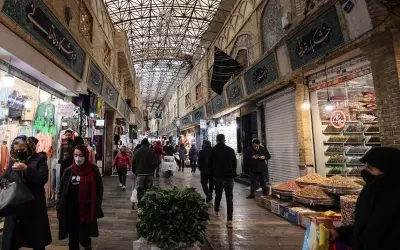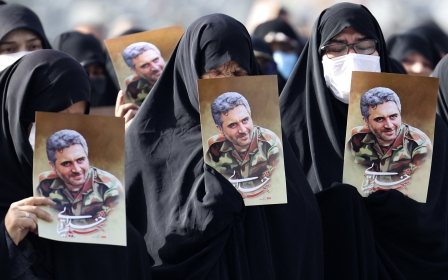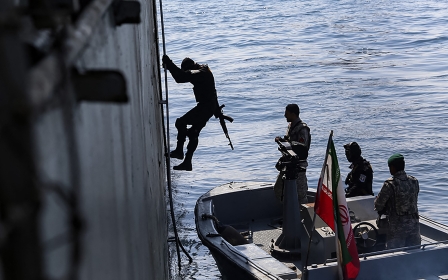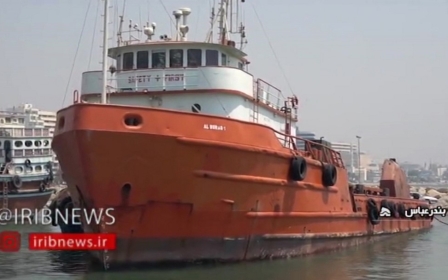Markets shrug off Iran's capture of oil tankers
The maritime insurance industry, a key gauge of risk sentiment, appears, for now, to have shrugged off the capture of two Greek-flagged oil tankers in the Gulf by Iranian forces, despite tensions running high in the region.
"The reaction has been relatively muted," Neil Roberts, head of marine and aviation at the insurance industry body Lloyd's Market Association, told Middle East Eye.
On Friday, Iranian commandos in helicopters and speedboats seized the Greek-flagged vessels Delta Poseidon and Prudent Warrior in retaliation for Athens impounding Iranian oil held aboard a ship in Greek waters at the request of the United States.
During periods of heightened geopolitical tensions, shipping rates tend to rise. Operators demand added compensation to send their vessels into dangerous waters, and underwriters bump up the cost to insure ships and their cargo against potential threats, increasing war risk premiums.
'A lack of erratic changes in the market may actually force the Iranian authorities to escalate,'
- Ali Alfoneh, Arab Gulf States Institute
Analysts caution it is still early into the crisis, and the situation could deteriorate quickly, with prices reflecting a subsequent rise in risk.
New MEE newsletter: Jerusalem Dispatch
Sign up to get the latest insights and analysis on Israel-Palestine, alongside Turkey Unpacked and other MEE newsletters
"Any further market shocks and threats against the oil trade can only result in boosting the freight rates, at least in the short term," Fotios Katsoulas at S&P Global Market Intelligence told MEE.
Bur for now, brokerage sources tell MEE that shipping rates have not risen notably and insurance premiums have remained relatively flat since Iran's confiscation of the Greek vessels.
"In past situations, similar to this, there has been a much bigger impact on the market," Richard Matthews, head of research at E A Gibson shipbrokers, told MEE. "This latest seizure hasn't impacted things like we expected."
Raising the price of 'no-deal'
Athens and Washington have criticised Iran's seizing of the vessels - each of which carries about one million barrels of oil - in addition to the detention of nine Greek crew members. Greece said the confiscations were an "act of piracy", and on Monday, US Secretary of State Antony Blinken called Iran's actions "a threat to maritime security and the global economy".
Iran said the vessels were stopped over unspecified "maritime violations". Iranian media close to the government had earlier threatened "punitive action" would be taken against Greece for its role in the capture of Iranian oil.
Analysts are concerned the tit-for-tat capture of vessels could herald a new round of tensions as the US and Iran both dig in their heels over stalled talks to revive the 2015 nuclear agreement.
Tehran has demanded the US lift sanctions on the Revolutionary Guards Corps, a move the US has ruled out. With prospects for an agreement fading, each side has indicated they are preparing for a no-deal scenario.
Last week, the White House's top Iran envoy told US lawmakers that Washington was ready to tighten sanctions on Tehran.
"The US and Iran are trying to impact the nuclear negotiations with these seizures," Ali Alfoneh, a senior fellow with the Arab Gulf States Institute, a Washington think-tank, told MEE. "Both want to show that the price could be higher for the other party if they don't reach a deal."
This is not the first time commercial shipping has been caught in the crossfire between Tehran and the West.
Iran sits on one end of the Strait of Hormuz, a narrow body of water and strategic chokepoint through which about 20 percent of the world's oil passes. During previous crisis, Iran has threatened to block the strait.
Following the Trump administration's decision to withdraw from the nuclear accord, tensions between the two rose and in 2019 the US accused Iran of launching a series of attacks on tankers in the Gulf. As explosions rocked vessels, insurance premiums skyrocketed.
"In 2019 there were direct kinetic attacks against tankers causing immediate physical damage in addition to the type of detentions and seizures we are seeing now," Svein Ringbakken, managing director of the Norwegian Shipowners' Mutual War Risks Insurance Association, told MEE.
"We are not expecting a dramatic rate hike," he added.
'Something bigger had to be done'
Another reason the market may be more sanguine is that Friday's vessel capture bears the hallmarks of past Iranian actions. In 2019, Britain seized an Iranian supertanker off the coast of Gibraltar for violating sanctions on Syria. Shortly after, Iran detained a British-flagged tanker in the Strait of Hormuz.
"It's basically the same exact playbook [as 2019]. Even the manner in which the Islamic Revolutionary Guards forces boarded the ships, coming in on helicopter," Sina Azodi, an Iran analyst at the Atlantic Council in Washington, told MEE.
"Iran is interested in drawing very clear red lines over these oil seizures and has developed a set pattern of tit-for-tat responses to each type of escalation," said Sanam Vakil, deputy director of the Middle East and North Africa programme at Chatham House.
That familiarity might have helped temper the maritime industry's initial knee-jerk response to the latest confiscation. "This was not entirely unexpected," Jakob Larsen, head of security at maritime industry body Bimco, told MEE.
"Shipowners are of course taking stock of the situation and evaluating the risk. There is no guarantee things won't escalate further, but it seems to be confined to a bilateral issue between Greece and Iran," Larsen added.
There is still potential for economic fallout. Greek shipowners control about 30 percent of the world's oil tanker fleet. Iran's semi-official Tasnim news agency said there were still 17 other Greek ships in the Gulf that the IRGC could seize. Greece has warned tankers flying its flag to avoid Iranian waters.
At the same time, large crude carriers - the type of vessels seized on Friday - are currently operating at significant losses. With prices depressed, Greek-flagged vessels may have even less reason to enter the Gulf if threats remain, potentially disrupting energy flows.
A maritime industry source told MEE that one oil major has already said they won't use Greek-flagged tankers for loading in the Middle East for fear such a vessel could become another target.
Oil prices rose 1.7 percent on the day of the vessels' capture. Brent Crude prices on Wednesday stood at $117.41 a barrel, up $3.27 from Friday's opening price of $114.14.
Analysts say the main driver behind Tehran's decision to seize the Greek tankers was largely political, and not intended to move the markets.
"The Islamic Republic wants to show they have the capacity to destabilise the region and respond to the West," Vakil said.
But unsettling the energy market, especially at a time when it already faces geopolitical shocks stemming from Russia's Ukraine invasion, could amplify Tehran's leverage with the West. The subdued reaction so far could prompt Iran to escalate further, said analysts.
"When the regime attacked vessels previously in 2019 it was disappointed oil prices didn't remain high for longer then a few days," said Alfoneh, at the Arab Gulf States Institute.
"The conclusion was that something bigger had to be done and they attacked Aramco," he added, referring to the Saudi oil giant whose facilities at Abqaiq were targeted in a drone and missile attack claimed by Yemen's Houthi rebels, but which UN investigators attributed to Iran. Iran denies involvement.
At the time, there was a glut of oil on the market and even that attack - which temporarily cut Saudi oil production by half - failed to meaningfully lift prices.
"A lack of erratic changes in the market may actually force the Iranian authorities to escalate more," Alfoneh said.
Middle East Eye delivers independent and unrivalled coverage and analysis of the Middle East, North Africa and beyond. To learn more about republishing this content and the associated fees, please fill out this form. More about MEE can be found here.





